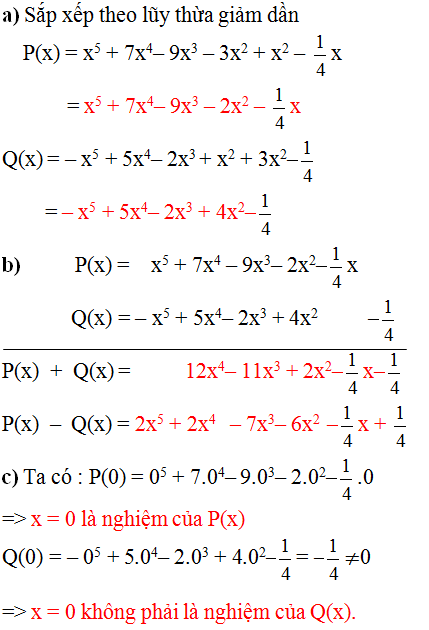
Hãy nhập câu hỏi của bạn vào đây, nếu là tài khoản VIP, bạn sẽ được ưu tiên trả lời.


a: \(\Leftrightarrow4^x\left(\dfrac{3}{2}+\dfrac{5}{3}\cdot4^2\right)=4^8\left(\dfrac{3}{2}+\dfrac{5}{3}\cdot4^2\right)\)
=>4^x=4^8
=>x=8
b: \(\Leftrightarrow2^x\cdot\dfrac{1}{2}+2^x\cdot2=2^{10}\left(2^2+1\right)\)
=>2^x=2^11
=>x=11
c: =>1/6*6^x+6^x*36=6^15(1+6^3)
=>6^x=6*6^15
=>x=16
d: \(\Leftrightarrow8^x\left(\dfrac{5}{3}\cdot8^2-\dfrac{3}{5}\right)=8^9\left(\dfrac{5}{3}\cdot8^2-\dfrac{3}{5}\right)\)
=>x=9

\(M\left(x\right)=x^4+\frac{11}{2}x^2+x+6=\left(x^4+\frac{9}{2}x^2+\frac{81}{16}\right)+\left(x^2+x+\frac{1}{4}\right)+\frac{11}{16}\)
=> \(M\left(x\right)=\left(x^4+2.\frac{9}{4}x^2+\left(\frac{9}{4}\right)^2\right)+\left(x^2+2.\frac{1}{2}x+\left(\frac{1}{2}\right)^2\right)+\frac{11}{16}\)
=> \(M\left(x\right)=\left(x^2+\frac{9}{4}\right)^2+\left(x+\frac{1}{2}\right)^2+\frac{11}{16}\)
Nhận thấy: Do \(\left(x^2+\frac{9}{4}\right)^2>0;\left(x+\frac{1}{2}\right)^2\ge0\)Với mọi x
=> \(M\left(x\right)>\frac{11}{16}\) với mọi x
=> Đa thức M(x) vô nghiệm (không có nghiệm)

1,
\(\left(2x+1\right)^3=-0,001\\ \left(2x+1\right)^3=\left(-0.1\right)^3\\ \Leftrightarrow2x+1=-0.1\\ 2x=-1.1\\ x=-\dfrac{11}{10}:2\\ x=-\dfrac{11}{20}\\ Vậy...\)
2,
\(\left(2x-3\right)^4=\left(2x-3\right)^6\\ \Leftrightarrow\left(2x-3\right)^6-\left(2x-3\right)^4=0\\ \Leftrightarrow\left(2x-3\right)^4\cdot\left[\left(2x-3\right)^2-1\right]=0\\ \Rightarrow\left\{{}\begin{matrix}\left(2x-3\right)^4=0\\\left(2x-3\right)^2-1=0\end{matrix}\right.\\ \Leftrightarrow\left\{{}\begin{matrix}2x-3=0\\\left(2x-3\right)^2=1\end{matrix}\right.\\ \Leftrightarrow\left\{{}\begin{matrix}2x=3\\2x-3=1\end{matrix}\right.\\ \Leftrightarrow\left\{{}\begin{matrix}x=\dfrac{3}{2}\\x=2\end{matrix}\right.\\ Vậyx\in\left\{\dfrac{3}{2};2\right\}\)
3, Làm tương tự câu 2
5,
\(9^x:3^x=3\\ \left(9:3\right)^x=3\\ 3^x=3\\ \Rightarrow x=1\\ Vậy...\)
6,
\(3^x+3^{x+3}=756\\ 3^x+3^x\cdot3^3\\ 3^x\cdot\left(1+27\right)=756\\ 3^x\cdot28=756\\ \Leftrightarrow3^x=27\\ 3^x=3^3\\ \Rightarrow x=3\\ vậy...\)
7,
\(5^{x+1}+6\cdot5^{x+1}=875\\ 5^{x+1}\cdot\left(1+6\right)=875\\ 5^{x+1}\cdot7=875\\ \Leftrightarrow5^{x+1}=125\\ \Leftrightarrow5^{x+1}=5^3\Leftrightarrow x+1=3\\ \Rightarrow x=2\\ Vậy...\)
9,

a) thu gọn đi rùi tìm ngiệm nhưng chắc đa thức P(x) ko có nghiệm đâu!!!!
nghĩ thui

Chạy tiếp sức
(a) bản chất chỉ là bước đệm để làm câu (b)
b)
lấy kq câu (a) của @ trước đó
\(M\left(x\right)=x^4+\dfrac{21}{4}x^2+\dfrac{1}{4}x^2+x+1+5\)
\(M\left(x\right)=x^4+\dfrac{21}{4}x^2+\left(\dfrac{x}{2}+1\right)^2+5\)
\(\left\{{}\begin{matrix}x^4\ge0\forall x\\\dfrac{21}{4}x^2\ge0\forall x\\\left(\dfrac{x}{2}+1\right)^2\ge0\forall x\\\end{matrix}\right.\) =>\(M\left(x\right)=x^4+\dfrac{21}{4}x^2+\left(\dfrac{x}{2}+1\right)^2+5>0\)với mọi x => M(x) không có nghiệm=> Nếu (a) đúng => dpcm
a) \(M\left(x\right)=P\left(x\right)+Q\left(x\right)\)
\(=x^4-5x+2x^2+1+5x+3x^2+5+\dfrac{1}{2}x^2+x\\ =x^4+\dfrac{11}{2}x^2+x+6\)

a. P(x)+Q(x)=(3x4 + x3- x2- \(\dfrac{1}{4}\)x)+(3x4- 4x3+x2-\(\dfrac{1}{4}\))=6x4-3x3+\(\dfrac{1}{2}\)
Tương tự làm P(x)-Q(X) nhé !!!
b. Thay x = 0 vào đa thức P(x) ta có :
.....................................................
thay x = 0 vào đa thức Q(x) ta có:
......................................................
=> đpcm

\(R\left(x\right)=x^2+6x+11=\left(x^2+6x+9\right)+2=\left(x+3\right)^2+2\ge2>0\)
\(\Rightarrow R\left(x\right)\) không có nghiệm
\(H\left(x\right)=x^2-8x+20=\left(x^2-8x+16\right)+4=\left(x-4\right)^2+4\ge4>0\)
\(\Rightarrow H\left(x\right)\) không có nghiệm

I . Trắc Nghiệm
1B . 2D . 3C . 5A
II . Tự luận
2,a,Ta có: A+(x\(^2\)y-2xy\(^2\)+5xy+1)=-2x\(^2\)y+xy\(^2\)-xy-1
\(\Leftrightarrow\) A=(-2x\(^2\)y+xy\(^2\)-xy-1) - (x\(^2\)y-2xy\(^2\)+5xy+1)
=-2x\(^2\)y+xy\(^2\)-xy-1 - x\(^2\)y+2xy\(^2\)-5xy-1
=(-2x\(^2\)y - x\(^2\)y) + (xy\(^2\)+ 2xy\(^2\)) + (-xy - 5xy ) + (-1 - 1)
= -3x\(^2\)y + 3xy\(^2\) - 6xy - 2
b, thay x=1,y=2 vào đa thức A
Ta có A= -3x\(^2\)y + 3xy\(^2\) - 6xy - 2
= -3 . 1\(^2\) . 2 + 3 .1 . 2\(^2\) - 6 . 1 . 2 -2
= -6 + 12 - 12 - 2
= -8
3,Sắp xếp
f(x) =9-x\(^5\)+4x-2x\(^3\)+x\(^2\)-7x\(^4\)
=9-x\(^5\)-7x\(^4\)-2x\(^3\)+x\(^2\)+4x
g(x) = x\(^5\)-9+2x\(^2\)+7x\(^4\)+2x\(^3\)-3x
=-9+x\(^5\)+7x\(^4\)+2x\(^3\)+2x\(^2\)-3x
b,f(x) + g(x)=(9-x\(^5\)-7x\(^4\)-2x\(^3\)+x\(^2\)+4x) + (-9+x\(^5\)+7x\(^4\)+2x\(^3\)+2x\(^2\)-3x)
=9-x\(^5\)-7x\(^4\)-2x\(^3\)+x\(^2\)+4x-9+x\(^5\)+7x\(^4\)+2x\(^3\)+2x\(^2\)-3x
=(9-9)+(-x\(^5\)+x\(^5\))+(-7x\(^4\)+7x\(^4\))+(-2x\(^3\)+2x\(^3\))+(x\(^2\)+2x\(^2\))+(4x-3x)
= 3x\(^2\) + x
g(x)-f(x)=(-9+x\(^5\)+7x\(^4\)+2x\(^3\)+2x\(^2\)-3x) - (9-x\(^5\)-7x\(^4\)-2x\(^3\)+x\(^2\)+4x)
=-9+x\(^5\)+7x\(^4\)+2x\(^3\)+2x\(^2\)-3x-9+x\(^5\)+7x\(^4\)+2x \(^3\)-x\(^2\)-4x
=(-9-9)+(x\(^5\)+x\(^5\))+(7x\(^4\)+7x\(^4\))+(2x\(^3\)+2x\(^3\))+(2x\(^2\)-x\(^2\))+(3x-4x)
= -18 + 2x\(^5\) + 14x\(^4\) + 4x\(^3\) + x\(^2\) - x

a, \(P\left(x\right)=4x-\dfrac{1}{2}\)
\(\Rightarrow P\left(x\right)=4x-\dfrac{1}{2}=0\)
\(\Rightarrow x=\dfrac{1}{8}\)
b, \(Q\left(x\right)=\left(x-1\right)\left(x+1\right)\)
\(\Rightarrow Q\left(x\right)=\left(x-1\right)\left(x+1\right)=0\)
\(\Rightarrow\left[{}\begin{matrix}x-1=0\\x+1=0\end{matrix}\right.\Rightarrow\left[{}\begin{matrix}x=1\\x=-1\end{matrix}\right.\)
c, \(A\left(x\right)=x^2-7x+6\)
\(\Rightarrow A\left(x\right)=x^2-7x+6=0\)
\(\Rightarrow x^2-6x-x+6=0\)
\(\Rightarrow x\left(x-6\right)-\left(x-6\right)=0\)
\(\Rightarrow\left(x-6\right)\left(x-1\right)=0\)
\(\Rightarrow\left[{}\begin{matrix}x-6=0\\x-1=0\end{matrix}\right.\Rightarrow\left[{}\begin{matrix}x=6\\x=1\end{matrix}\right.\)

\(x^4+\dfrac{11}{2}x^2+x+6=\left(x^4+4x^2+4\right)+\dfrac{1}{2}\left(x^2+2x+1\right)+\dfrac{1}{2}x^2+\dfrac{3}{2}\)
\(=\left(x^2+2\right)^2+\dfrac{1}{2}\left(x+1\right)^2+\dfrac{1}{2}x^2+\dfrac{3}{2}\)
Do \(\left\{{}\begin{matrix}\left(x^2+2\right)^2>0\\\dfrac{1}{2}\left(x+1\right)^2\ge0\\\dfrac{1}{2}x^2\ge0\end{matrix}\right.\) với mọi x
\(\Rightarrow\left(x^2+2\right)^2+\dfrac{1}{2}\left(x+1\right)^2+\dfrac{1}{2}x^2+\dfrac{3}{2}>0\) với mọi x
Vậy đa thức không có nghiệm